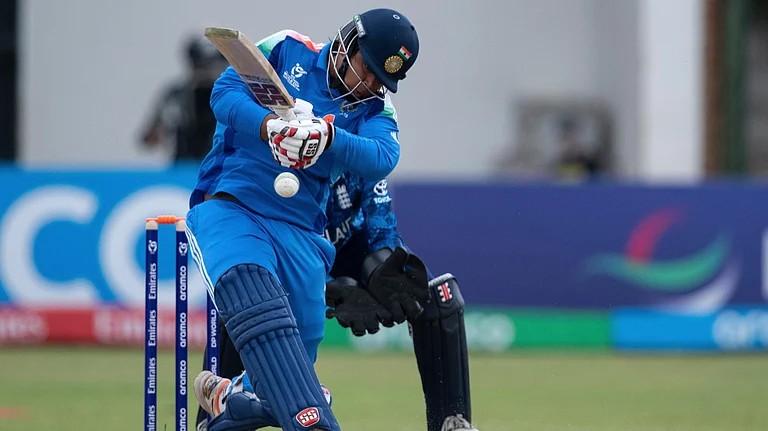“They asked the voters of Karnataka to look at Kerala. They did. End of the story,” says one of the posts circulating on social media in Kerala after the Bharatiya Janata Party (BJP) lost the Karnataka assembly elections.
The post addresses the promotion of film ‘The Kerala Story’ by the BJP in the run-up to Karnataka elections. The film, based on ‘love jihad’ conspiracy theory, was termed as anti-Muslim and political propaganda by its critics among Opposition parties.
After the film’s usage by the BJP in election campaign failed to generate political traction in its favour, Kerala appears to enjoy the time of “revenge” as the “hate campaign” against the state carried out by BJP leaders during campaign failed.
Some other messages going around in Kerala’s social media circles are:
“Modi and Amit Shah reached Karnataka, asked the people to look at Kerala. They did and found no BJP there.”
“Amit Shah warned the people of Karnataka that Kerala is their neighbouring State. If they don’t vote for BJP, Karnataka will become like Kerala. The people of Karnataka decided to be like Kerala.”
These two messages refer to the fact that the BJP has no electoral muscle in Kerala.
Though the election concerns the neighbouring state of Karnataka and Kerala has nothing to do with it, the results are being seen as a moment of victory in Kerala as well. In the final hours of the Karnataka election campaign, Prime Minister Narendra Modi and Union Home Minister Amit Shah referred to the film ‘The Kerala Story’ and warned the people of Karnataka to “look at Kerala”. They cautioned that if the people of Karnataka did not vote for the BJP, their state would become like Kerala.
ANI on Wednesday reported that Modi said that the film ‘The Kerala Story’ brought out the terror conspiracies happening in Kerala. He has also said that Congress could be seen standing with these terror trends and the people of Karnataka should be cautious about Congress. ‘The Kerala Story’ is based on the idea that many women and girls have been converted to Islam in Kerala and sent to fight for terrorist organisations in West Asia.
According ANI, ‘The Kerala Story’ had become one of the major campaign themes in Karnataka. The BJP leaders have also referred to ‘The Kashmir Files’ in the campaign to talk about terrorism and how BJP guards against the same. However, the Karnataka assembly election results show that the people rejected the propaganda stories and looked for some real ones.
As far as the people of Kerala are concerned, the emphatic victory of Congress in Karnataka is a fitting reply to the campaign against Kerala. The Malayalam social media is awash with trolls referring to the call by the BJP leaders to the voters of Karnataka to look at Kerala. The posts use hashtags like ‘The Karnataka Story’, ‘The South India Story’, ‘The Real Kerala Story’ and ‘BJP Mukth South India’. Such posts have been widely shared.
Senior political leaders have also joined this social media celebration. Dr Thomas Issac, CPI-M leader and former Finance Minister, wrote on Facebook that the Karnataka results are a tight slap on the face of BJP that spewed venom to win an election.
He wrote, “In the last moment, they even tried their luck with a third rate propaganda film ‘The Kerala Story’. The Home Minister Amit Shah took up the lead with hate campaign against Kerala. Nothing worked in favour of them.”
“Very crucial day for South India,” said Kerala Chief Minister Pinarayi Vijayan at a public function in Kollam. “The entire South is liberated from BJP. This gives a clear indication towards the future of the country. The Prime Minister camped around 10 days for campaign, yet the people of Karnataka rejected hate campaign and gave a fitting reply.”
The map of India displaying the shrinking space of BJP has also been widely shared by the Keralites with a sense of belongingness for South India. Interestingly, the usual Congress-CPIM fights were not very visible on the day of Karnataka results and the Left handles openly expressed excitement and happiness over the victory of Congress.
A poster of ‘South India Story’ with the pictures of the Chief Minister of Kerala, Tamil Nadu, Andhra Pradesh, and Telengana along with Siddaramaiah and D K Shivakumar was another one that went viral on social media.
The social media responses in Kerala give enough indication that aggressive form of nationalism would cause the emergence of sub-nationalism as a form of resistance. The mood set in these social media posts does not cater just to the cultural identity of Kerala but that of South India as a whole. The posts in Malayalam referring to the Dravidian identity of the South and the legacy of Basaveswara, the 12th century Lingayat social reformer and philosopher, gained wide popularity in the Facebook constituency of Kerala.





















